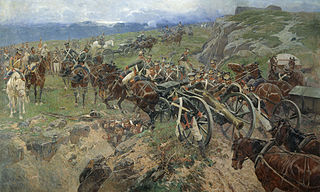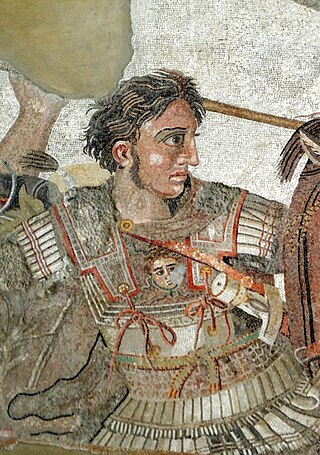 W
WThe Battle of Gaugamela, also called the Battle of Arbela, was the decisive battle of Alexander the Great's invasion of the Persian Achaemenid Empire. In 331 BC Alexander's army of the Hellenic League met the Persian army of Darius III near Gaugamela, close to the modern city of Dohuk in Iraqi Kurdistan. Though heavily outnumbered, Alexander emerged victorious due to his army's superior tactics and his deft employment of light infantry. It was a decisive victory for the Hellenic League and led to the fall of the Achaemenid Empire.
 W
WThe Battle of the Granicus River in May 334 BC was the first of three major battles fought between Alexander the Great and the Persian Empire. Fought in northwestern Asia Minor, near the site of Troy, it was here that Alexander defeated the forces of the Persian satraps of Asia Minor, including a large force of Greek mercenaries led by Memnon of Rhodes.
 W
WThe Anglo-Soviet invasion of Iran, also known as the Anglo-Soviet invasion of Persia, was the joint invasion of Iran by the United Kingdom and the Soviet Union in August 1941. The invasion, codenamed Operation Countenance, was largely unopposed by the numerically and technologically inferior Iranian forces. The multi-pronged coordinated invasion took place along Iran's borders with modern Iraq, Azerbaijan and Turkmenistan with fighting beginning on 25 August and ending on 31 August when the Iranian government formally agreed to surrender, having already agreed to a ceasefire on 30 August.
 W
WThe Iran–Iraq War was a protracted armed conflict that began on 22 September 1980 when Iran was invaded by neighbouring Iraq. The war lasted almost eight years, ending in a stalemate on 20 August 1988 when Iran accepted a UN-brokered ceasefire. Iraq's rationale for the invasion was primarily to cripple Iran and prevent Ayatollah Ruhollah Khomeini from exporting the 1979 Iranian Revolution movement to Shia-majority Iraq and threaten the Sunni-dominated Ba'athist leadership. Iraq had also wished to replace Iran as the dominant state in the Persian Gulf, which had not been previously possible due to pre-revolutionary Iran's goliath status in both economic and military terms as well as its close alliances with the United States and Israel. The war followed a long-running history of border disputes, as a result of which Iraq had planned to annex Iran's oil-rich Khuzestan Province and the east bank of the Shatt al-Arab.
 W
WThe Iraqi Invasion of Iran was launched on 22 September and lasted until 7 December 1980. The invasion stalled in the face of Iranian resistance, but not before Iraq captured more than 15,000 km2 of Iran's territory. This invasion led to eight years of war between Iran and Iraq.
 W
WThe Mongol conquest of Khwarezmia, or the Mongol invasion of Iran (Persia), from 1219 to 1221 marked the beginning of the Mongol conquest of the Islamic states. The Mongol expansion would ultimately culminate in the conquest of virtually all of Asia as well as parts of Eastern Europe, with the exception of Japan, the Mamluk Sultanate of Egypt, Siberia, and most of the Indian subcontinent and Southeast Asia.
 W
WThe Muslim conquest of Persia, also known as the Arab invasion of Iran, led to the fall of the Sasanian Empire of Iran (Persia) in 651 and the eventual decline of the Zoroastrian religion.
 W
WThe Persian Campaign or Invasion of Iran was a series of engagements in Iranian Azerbaijan region involving the forces of the Ottoman Empire against those of the British Empire and Russian Empire, and also involving local Persian population elements, beginning in December 1914 and ending with the Armistice of Mudros on October 30, 1918, as part of Middle Eastern theatre of World War I.
 W
WThe Russian occupation of Tabriz lasted from 30 April 1909 until 28 February 1918, with a brief interruption during 6–31 January 1915. The city of Tabriz was the second city of Qajar Persia at the time, the capital of the region of Azerbaijan, and the traditional residence of the Qajar Crown Prince.
 W
WThe Russo-Persian War of 1722–1723, known in Russian historiography as the Persian campaign of Peter the Great, was a war between the Russian Empire and Safavid Iran, triggered by the tsar's attempt to expand Russian influence in the Caspian and Caucasus regions and to prevent its rival, the Ottoman Empire, from territorial gains in the region at the expense of declining Safavid Iran.
 W
WThe 1804–1813 Russo-Persian War was one of the many wars between the Persian Empire and Imperial Russia, and began like many of their wars as a territorial dispute. The new Persian king, Fath Ali Shah Qajar, wanted to consolidate the northernmost reaches of his kingdom—modern-day Georgia—which had been annexed by Tsar Paul I several years after the Russo-Persian War of 1796. Like his Persian counterpart, the Tsar Alexander I was also new to the throne and equally determined to control the disputed territories.
 W
WThe Russo-Persian War of 1826–1828 was the last major military conflict between the Russian Empire and Iran.
 W
WThe wars of Alexander the Great were fought by King Alexander III of Macedon, first against the Achaemenid Persian Empire under Darius III, and then against local chieftains and warlords as far east as Punjab, India. By the time of his death, he had conquered most of the world known to the ancient Greeks. However, he failed to conquer all of South Asia. Although being successful as a military commander, he failed to provide any stable alternative to the Achaemenid Empire—his untimely death threw the vast territories he conquered into civil war.